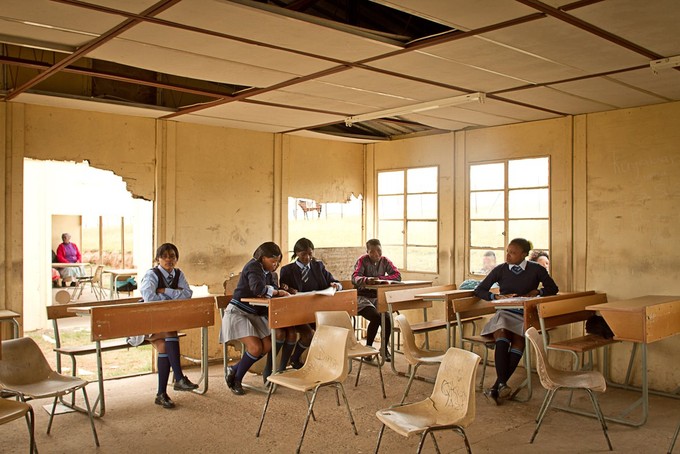Minister Angie Motshekga’s ugly lesson for learners
How she has shown that their confidence in representative government is misplaced
In our country’s schools, inequality is built into the walls. It reflects off the corrugated sheets of metal that enclose teaching spaces.
It stifles creative thinking in the unbearably hot classrooms in the warm months and freezes any educational progress in the cold ones. It leaks through the cracks in the ceiling with the rain and sneaks through holes in the floors with the snakes. It follows students from the classroom to the bathroom as learners move from squatting on bricks for lack of chairs to squatting over pit latrines for lack of decent toilets.
Thousands of learners and teachers brace themselves for these hazards each morning. According to the most recent government study, over 5,000 schools have either no access to water or an unreliable supply; more than 3,900 have either no or unreliable electricity; and 7,912 either rely on pit latrines only or have no ablution facilities at all.
This past August, one pit latrine at Kalalo Junior Secondary School, Eastern Cape, caved in, dropping a caretaker into a two-meter-deep pool of human waste. Mr Saphepha barely survived. Two years ago a dilapidated pit latrine at Mahlodumela Primary, Limpopo, collapsed, claiming the life of Michael Komape, a five-year-old child who was just one week into his first school year.
Faced with these conditions, learners acted. Eight years ago, they started to meet with their peers, parents, and teachers. Learners began to build a movement, Equal Education, and believed that if they mobilised, through careful learning and committed activism, their government would be compelled to listen and respond.
Their movement quickly grew and spread around the country. On Human Rights Day, 21 March 2011, many thousands of people linked arms and marched through the streets of Cape Town. Some were from rural villages and others from urban centers. Some were parents, others teachers, but most were learners, many under 15. Together, they held signs, chanted songs, and expressed a common creed: equal education means safe and adequate school infrastructure for all.
Unfortunately, Minister of Basic Education Angelina Motshekga did not listen. For three years, she resisted the learners’ demands, refusing to adopt a set of binding national regulations that would require provinces to fix their decrepit schools. When Motshekga finally did adopt the regulations, they appeared to be binding in name only, as vague language and loopholes made it easy for the provinces to shirk their legal duties with impunity.
In creating these deficient regulations, the Minister taught the learners that their confidence in representative government was misplaced. That is an ugly lesson. Learners should not be made despondent before they can even vote. It is our job to help them make real the democracy they envision.
We can take the initiative by, together with learners, issuing two simple demands to Minister Motshekga: close the loopholes in the national regulations immediately, and address those schools in most dire need of infrastructure, especially schools with no water, power supply or sanitation, by 29 November 2016. In theory, the regulations establish a timeline for repairing and replacing the nation’s worn-down schools. In reality, the state’s duties in these timelines are stated vaguely and subject to the availability of resources.
Weak language has allowed provincial governments to craft woefully inadequate school infrastructure plans with no apparent consequences. Using the regulations’ shortcomings as cover, the provinces do not even attempt to conceal their inability to conform to the regulatory “deadlines”.
The provinces’ delays are nothing new. In the early 90s, government promised to fix the country’s schools but instead allowed the problems to fester. Today, the youth of that era have grown and have children of their own. Those who cannot afford the fees of the better-resourced schools must now watch their children struggle in conditions not unrecognizable to that of their own schooling – without libraries, laboratories, safe fencing and adequate classrooms – conditions that made their success so much harder to reach. The government is poised to ensnare another generation in the cycle of false promises and lost opportunities.
But this story is not over; our children are marching on. It’s time for us to join.
Views expressed are not necessarily GroundUp’s.
Support independent journalism
Donate using Payfast

Don't miss out on the latest news
We respect your privacy, and promise we won't spam you.
Next: No water, no toilets, no houses, no plan: Endlovini residents are “just desperate”
Previous: Is UCT a safe space for art?
© 2016 GroundUp. 
This article is licensed under a Creative Commons Attribution-NoDerivatives 4.0 International License.
You may republish this article, so long as you credit the authors and GroundUp, and do not change the text. Please include a link back to the original article.

